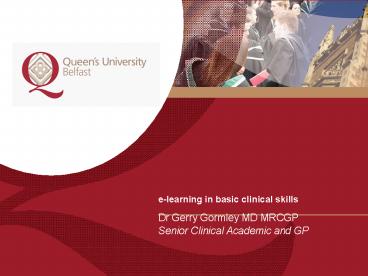elearning in basic clinical skills - PowerPoint PPT Presentation
1 / 34
Title:
elearning in basic clinical skills
Description:
Allows the learner to create an advanced planner' upon which new learning can be ... http://www.ltss.bris.ac.uk/jules/jtap-623.pdf ... – PowerPoint PPT presentation
Number of Views:85
Avg rating:3.0/5.0
Title: elearning in basic clinical skills
1
e-learning in basic clinical skills Dr Gerry
Gormley MD MRCGPSenior Clinical Academic and
GP
2
Overview
- Background to clinical skills
- Development of an e-learning clinical skills
environment - Clinical skills website tour
- Evaluation of e-learning in clinical skills
learning
3
Clinical skills
4
Clinical Skill acquisitionsee one, do one,
teach one..
5
Cognitive phase
- Observe expert demonstrate skill
- Allows the learner to create an advanced
planner upon which new learning can be
structured
6
Associative phase
- Opportunity to practice skill
- Facilitate integration of new knowledge
- Encourage
- Feedback
- Connections
- Reflection
7
Learning trajectory
?
?
Performance of task
competency
Number of practice trials
8
(No Transcript)
9
Development of a Clinical Skills website
10
- CSEC website launched in November 2004
- Aims
- Supplement student learning
- Act as a teaching resource
- Promote vertical / horizontal integration
- Promote standardization of teaching
11
Multidisciplinary
GMC
NPSA
External images - permission
Royal Colleges
Patient consent
External bodies
Text
Images
Web ready
Clinical skills networks
Script
Content
Page design
Curriculum
Film
Study guide
Video
WEB PAGE?
Teacher feedback
Edit
Student feedback
Web ready
Evaluation
Periodic update
Feedback / evaluation
Internal review
External review
12
Website tour
13
? www.qub.ac.uk/cskills
14
Evaluation of e-learning in Clinical Skills
15
(No Transcript)
16
- e-learning gaining popularity in undergraduate
curriclua - Greenhalgh T. CAL in undergraduate medical
education BMJ 200176852-5 - Educationalists have been encouraged to evaluate
the impact of e-learning in the medical setting. - Cook J. The role of virtual learning
environments in UK medical Education. 2001
http//www.ltss.bris.ac.uk/jules/jtap-623.pdf - However, evidence limited in effectiveness of
e-learning in basic clinical skills learning
17
Objectives
18
- Assessed students perceived
- IT accessibility and literacy
- Impact of CAL on the learning of clinical skills
- Preferred methods of e-learning in clinical
skills - Factors associated with e-learning assessment
performance
19
Method
20
Brain storming
Focus group
Literature review
Draft questionnaire
Pilot questionnaire
Deploy questionnaire
2nd year medical students basic clinical skills
course n269
Basic clinical skills OSCE score Cronbachs ?
0.75
Data entry
Analysis and interpretation
21
Results
22
(No Transcript)
23
(No Transcript)
24
(No Transcript)
25
(No Transcript)
26
(No Transcript)
27
(No Transcript)
28
(No Transcript)
29
(No Transcript)
30
Conclusions
31
- e-learning has a positive role in basic clinical
skills learning - Promotes examination of real patients and
standardization of teaching - Students find videos important in the development
of their psychomotor skills - Students who display deep learner traits when
utilizing e-learning in clinical skills - perform
better in OSCEs - Development and utilization of e-learning
environments needs to promote aspects of deep
learning
32
Newer technologies are not necessarily better
than traditional methods of teaching..the choice
of technology needs to be driven by the learner,
not by its novelty.. Bates AW. Technology,
open learning and distance education. London
Routledge 1995.
33
Acknowledgements
34
The team Dr Kate Collins, Mairead Boohan, Dr
Helen Wilson and Mark McCalmont Audiovisual Alan
Soutar Amanda Sefton, Media Services, Queens
University Belfast Funding Centre for
Educational Development (TQEF) Statistical
analysis Mr Mike Stevenson, Division on Medical
Education, School of Medicine Dentistry































